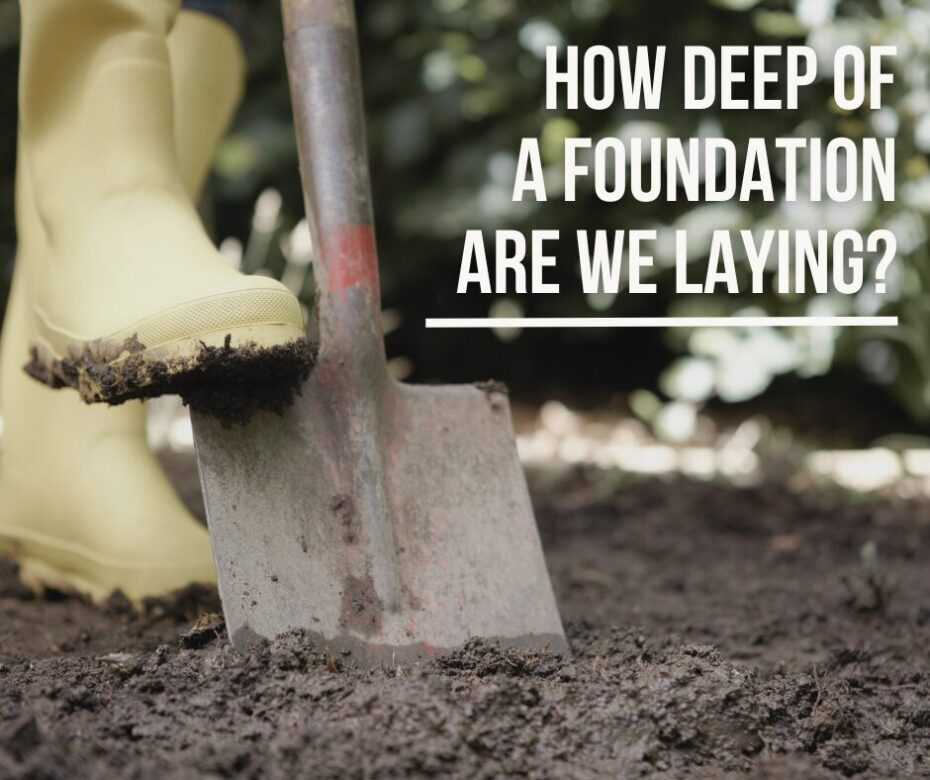In Luke 6:48, the Lord is concluding His “Sermon on the Plain” (6:20-49). In the sermon, He had told His disciples how they were to live. He told them they needed to do some very difficult things. They needed to be humble, to love their enemies, and to pray for people who mistreated them, to name just a few.
In the conclusion, He points out that the believer who does the things He taught will be like a man who builds his house on a rock, or a solid foundation. To lay that foundation, he will need to dig deep.
In the NKJV translation, there is only one verb, modified by an adverb–he dug deep. In the Greek, however, there are two verbs. It says that he dug and that he dug deep.
I am not sure why the Lord used two verbs here, but there is clearly an emphasis on digging. I have not done much digging in my life, but I’ve done enough to know I don’t like it. It hurts my hands. I think I have baby hands. When I dig, I run the risk of getting blisters, or at least what are called hot spots.
I understand that what the Lord is talking about takes a lot of work.
In the past, I just assumed I knew what the Lord meant. The believer already has eternal life. Christ is talking to believers here and is telling them how to be His disciples and be rewarded in His kingdom. If they make that decision, they need to build their lives upon a solid foundation.
His words are that foundation. I have often taught on this passage and have said something like this: “Christ’s words are the only firm foundation on which we should build our lives. Christ’s words provide a deep and sturdy foundation for all we do. When He says we are to dig deep, He is talking about how strong a foundation His words are. They will never fail. What we do for Him will survive this world. It will go on for eternity.”
All of that is true, so I won’t be too hard on myself. Maybe you see these words in the same way.
But just recently I realized that the Lord might have intended a slightly different emphasis. When He talks about digging deep, maybe He is referring to how we treat His words. When you read the “Sermon on the Plain,” you find that He says some challenging things.
Let’s be honest. When we first hear them—at least some of them—we don’t believe them. How about this one from the sermon: “To him who strikes you on the one cheek, offer the other also” (v 29)? That doesn’t make sense from a human point of view.
Much of what He says is also hard to understand. What does it mean to be poor or to have hunger as a condition of being blessed (vv 20-21)? I may believe it, but I don’t know what it means.
Don’t we often experience such thoughts when we study His words? How can we do what He says to do when we either don’t believe it or don’t understand it?
Here is what I think might be going on. The Lord wants us to understand and believe what He says. That takes work. We have to dig, and sometimes dig deep, to reach that goal. If at first I don’t believe something, I know I am wrong. Maybe I have taken it out of context. Maybe I need to change my perspective and see the wisdom of what He is saying. That will take some time of deep study.
If I have no idea of the meaning of something He says, I need to spend some time figuring it out. It can be frustrating. I need to dig deep in the Word, asking the Spirit for the wisdom to understand.
All of that takes work. It’s like digging a ditch.
If I am going to build my life on the foundation of Christ’s Word, I will be laying a strong and wise foundation. What I am suggesting is that in order to lay that foundation, I have to understand and believe what He says. To do that, I have to dig—and sometimes dig deep—into what the King says.


